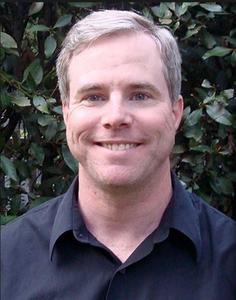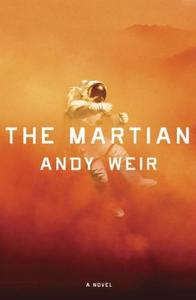
Weir's debut novel, The Martian (just published by Crown), is speculative science fiction with an emphasis on the science. Astronaut Mark Watney is stranded on Mars after a mission goes horribly wrong. Injured and presumed dead, Watney must use his wits, the limited supplies on hand, and his background in mechanical engineering and botany to survive long enough for a rescue mission to be sent from Earth.
It's a harrowing tale, yet it's full of humor and genuine warmth. The math and scientific facts are spot-on--non-science-minded readers as well as space nerds will sail on through, loving every minute of the fast-paced thrill ride.
Why did you write The Martian?
Honestly, I wanted to recapture the thrill I got when I watched Apollo 13. It's like MacGyver in space, with billions of dollars of equipment being misappropriated to barely stay alive, and everybody working together, and I just love that.
I love man-versus-nature stories in general, and I liked Apollo 13 because there's no ambiguity over who you're rooting for. Sometimes when I'm seeing a story where there're good guys and bad guys, I start analyzing the bad guy's point of view, empathizing with him. But in man versus nature, it's always very clear: it's all of us versus the physical world. It drills down into something very deep and fundamentally human about us, where we have this overwhelming desire to cooperate against nature. Tapping into that feeling in the reader is what I was shooting for.
You wrote The Martian to be as scientifically accurate as possible. How did you manage also to write a compelling story?
I tried to make the main character, Mark Watney, as approachable and likable as possible. If the reader is rooting for the protagonist, they'll forgive you just about everything else. So I made him a smartass, and he's really snarky and self-effacing, things like that. I had to get the humor in there, otherwise it's just a dry science lesson. His being really sarcastic makes the narrative much more fun to read.
Also, first-person narration is great. When you're writing third-person, there's this kind of presumed professionalism in the narrator, that the narrator doesn't have a personality and it's the story itself that you should be paying attention to. But in first-person narration, which most of the book is, it's like he's sitting in a room talking to you. You can really get a feel for his personality. Which is really the only way to do it, because he's the only guy there on Mars. There's no one else.
Did you talk to people at NASA? Did you do a lot of this research on your own?
I did everything on my own. Now I have some contacts at NASA because they read the book and sent me e-mail, which is way cool. It's really weird to just wake up one morning, check e-mail, and see fan mail from astronauts.
So now I have people at NASA I could talk to and ask questions of, but when I was writing it, I didn't have any connections at all. It was all research online. Manned space flight has always been an interest most of my life, so I started with a pretty heavy knowledge base in the area already.

For the NASA people, I needed a whole bunch of types. I tried to minimize how many roles there would be, but NASA has fairly defined roles. You know there's going to be a flight director, you know there's going to be a manager in charge of everything, you know there's going to be a press secretary. I found myself having to come up with a whole bunch of characters, and I didn't want to spend a lot of time developing each one of them, so I tried to give them slightly more extreme personalities than you would run into in the real world.
When I had to make a new character, I tried to give them some quirk or something like that, so that if nothing else, the reader won't get confused about which one is which. It's like, "Oh yeah, she's swearing a lot. That's the press secretary."
What about the astronauts? Did you do any research on personality types or how people get along in space?
I don't know anything about that in reality; all I know is what I've seen in documentaries and films about astronauts, again, like Apollo 13. And transcripts from missions, which I've also read because I'm that level of nerd.
My interpretation of what their personalities are like is based on what I've seen in those. I don't know if it's accurate at all, but it's what I think of astronauts as being like, so that's how I wrote them.
Were you ever tempted to tone down the science and math?
That was probably the toughest part of writing this book. It was a constant struggle to decide what I wanted to describe and what I didn't, because I did all the work under the hood. I worked everything out. You kind of want to brag to the reader: "Hey, look at this, I did this and this and tell me I'm cool." If it's not completely pertinent to the story, though, it shouldn't go in.
It all comes down to when people are reading it, do they stop and think something is implausible? If so, then I need to explain the science behind it. I didn't want it to be dry science, but I didn't want it to be hand-wavy physics, at least from the reader's point of view. So it was tough putting in the right amount. There are places in the book where, looking back, I went too far into the science side, but that's okay, I guess I can err on the side of science.
How did you figure it all out in such incredible detail?
I worked on it one problem at a time. I didn't plot out the whole story from start to finish. I'd look at his initial problem, and figure out how Mark was going to solve that. Then I'd work out all the details on how he solves it, and usually by sitting down and doing the math and doing all the science behind it, that would tell me what the next problem would be.
Sure, he can do this one thing, but that's going to cause this other problem. Or there's a good chance he will mess the solution up, so maybe I'll have that happen, and so on. I had it grow organically, I guess. --Rob LeFebvre, freelance writer and editor

